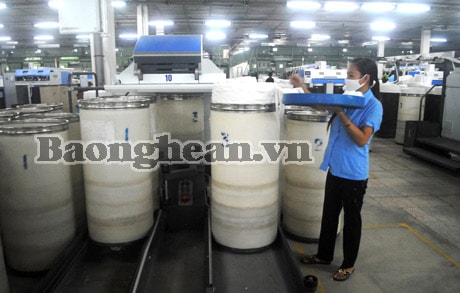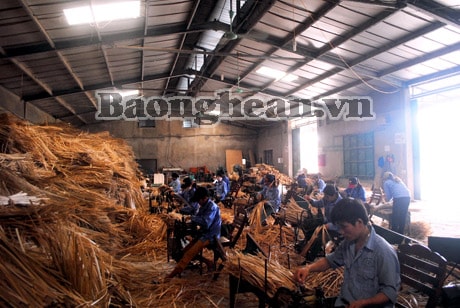Energy Saving: Reduce Input Costs
(Baonghean) -Energy saving in industrial production enterprises not only brings economic value to energy-using enterprises, but also has an impact on social life. Currently, although every enterprise wants to save energy to reduce costs, in reality, the number of enterprises with effective measures to save energy is not much.
Currently, the main energy sources used in industrial production enterprises in the province are electricity, gasoline, oil, gas, etc. Of which, electricity is used the most, accounting for more than 80%.
Using energy, especially saving and efficient electricity, has become a top concern of countries around the world. Implementing Directive No. 171/CT-TTg dated January 26, 2011 of the Prime Minister on strengthening electricity saving, on April 6, 2011, the Provincial People's Committee issued Decision No. 1061/2011/QD-UBND.CN approving the program of saving and efficient energy use. The Provincial People's Committee has focused on enhancing the role of State management in the field of electricity use. At the same time, actively propagating to raise awareness for the community; supporting manufacturers of energy-saving products, bringing products to businesses and people; using energy economically and efficiently in buildings and transportation activities.
In particular, since the Law on Economical and Efficient Use of Energy was promulgated, the Nghe An Department of Industry and Trade has worked with the Energy Conservation Office (Ministry of Industry and Trade) to develop the province's National Target Program on Economical and Efficient Use of Energy in 2012. The Nghe An Center for Industrial Promotion and Industrial Development Consulting has organized training courses on economical and efficient use of energy for officials of the Industry and Trade sector, industrial production enterprises, small-scale industries, craft villages and electricity management cooperatives in the province.
The Industrial Promotion Center has organized work and provided consultation to 13 key energy-using establishments according to Decision 1294/QD-TTg issued by the Government. For example, Hoang Mai Cement Company, Hoang Thi Loan Textile Company, Saigon - Central Beer Joint Stock Company (Sabeco)... Also through the program of using energy economically and efficiently, many enterprises in the area have proactively improved techniques, increased production productivity and saved electricity.
For the Textile industry, energy saving is the solution to the problem of saving production costs, reducing product prices to increase competitiveness in the market. Recognizing the role of energy saving in production and business, Hoang Thi Loan Textile Joint Stock Company has proactively invested in energy-saving equipment and technology, replacing outdated equipment and products that consume a lot of electricity with new equipment.

Production line at Hoang Thi Loan Textile and Garment Joint Stock Company.
Mr. Tran Quoc Tuan, Head of Production Management Department of the company said: After the Law on economical and effective use of energy was issued, the Company established a Steering Committee and implemented 5 main groups of solutions to practice electricity saving starting from October 2012. Of which, there are 3 important groups of solutions: technical solutions, solutions on organization, arrangement, production management and solutions on investment in new techniques, equipment and technology. The Company has replaced the inverter system in 8 production rooms to adjust the electricity according to the weather.
Thanks to that, the amount of electricity consumed by these 8 production rooms was reduced by 30%. Next, the company invested in a capacitor system for the transformer stations. Specifically, before participating in Cleaner Production, the company's transformer stations were installed in the 1980s and only operated at 50% capacity. During the implementation of the program, the company installed new capacitors for the transformer stations and transferred the load of 6 stations to 4 stations. At a cost of about 2,930 USD, this solution helped the company save about 113 MWh/year, equivalent to 5,831 USD.
The next solution implemented by the company is to improve the ventilation system in the AC rooms for the No. 1 yarn factory and to get light for the garment factory, so as not to use air conditioning in the summer but still solve the cooling system for the factory. This solution saves 532,683 kwh/year, and was considered by the Nghe An province's technical innovation council to win the second prize for Science and Technology initiative...
For Hoang Mai Cement Joint Stock Company, with a designed capacity of 1.4 million tons/year, the Company has to pay an average of over 10 billion VND for electricity each month. Mr. Nguyen Cong Hoa - Deputy Director of the Company said: After receiving the Prime Minister's Directive and working with the electricity industry, the Company has established a steering committee for electricity saving to propose necessary solutions. In particular, it is worth noting the arrangement of reasonable machine running time, arranging periodic furnace repairs in April instead of repairing the furnace in February. April - May - June is the peak time of electricity shortage, so if the furnace is stopped for periodic repairs during this time (7 days/repair) it will contribute to saving a significant amount of electricity.
Saving electricity can be done in production equipment such as dust filters at intermediate dumping doors, which still does not affect the environment, because the dust filters are designed for dry coal, but if the coal is wet in the rainy season, there is no need to use dust filters, thus also saving a significant amount of electricity. In addition, the company has arranged to run the machine to avoid peak hours, minimizing the use of air conditioners in the working areas. For air conditioners that need to be used, the company requires them to be above 25 degrees Celsius, reducing lighting in public areas in the company to save lighting in the operating area. Although newly implemented, the proposed saving measures will help Hoang Mai Cement Joint Stock Company save 10% of electricity costs.
As a small enterprise, Duc Phong Co., Ltd. (located in Nghi Phu Industrial Park) is also very concerned about the issue of energy saving. Realizing the large amount of consumption from the unreasonable use of electricity, the company has implemented many measures to minimize the amount of electricity used. The company has replaced the entire factory lighting system from neon bulbs with energy-saving bulbs, arranged the workplace reasonably to take advantage of outside light and avoid spreading out causing waste of lighting electricity.
Mr. Thai Dai Phong, Director of the company said: Since receiving advice from technical experts, the company has applied many low-cost measures to limit the use of electricity in production. Each month, the company saves tens of millions of dong, in addition, the awareness and attitude of employees have also changed, helping the company operate more stably.

Duc Phong Company Limited uses sunlight to save electricity.
The energy saving program in industrial production has been widely publicized and disseminated, but it has not yet created a strong impact on the awareness of saving electricity of enterprises. Meanwhile, according to experts, the energy saving capacity of Nghe An is still large, about 30%.
Currently, Nghe An has more than 10,800 large and small enterprises, the rate of energy consumption for industrial production activities in the area accounts for 30% of the total energy consumption of the whole province. Of which, there are more than 2,000 production and business enterprises using large amounts of electricity with an electricity loss of about 10% - 40%. If 30% of enterprises apply energy saving solutions, the amount of electricity in particular and energy in general will be saved greatly. Waste of electricity and inefficient use of electricity are largely caused by outdated technology. What is alarming is that in reality, some enterprises continue to invest in old technologies, discarded from abroad, causing energy waste, pushing up the cost and selling price of products. If the selling price is too high, enterprises will "lose right at home" in the fierce competition of similar goods. Therefore, it requires manufacturers to have a more far-sighted and decisive view in technological innovation.
The biggest difficulty in implementing the program effectively is funding. Currently, the Steering Committee and specifically the Energy Saving Department (Industrial Promotion Center) are still operating based on national funding, receiving about 200 million VND per year. Meanwhile, the province's planned funding of 1.5 - 2 billion VND per year is waiting for approval by the Provincial People's Council. Because it has just been established, the policies have not been specified and the apparatus has not been unified, so the achieved results are still limited.
Mr. Phan Thanh Tinh, Director of the Department of Industry and Trade (Deputy Standing Committee of the Steering Committee for the program on economical and efficient use of energy) said: After more than 2 years of implementing the program, the results of economical and efficient use of energy are still modest. For companies, factories, and restaurants, which are large energy users, the response to this program is still limited. Currently, there are no sanctions when these units do not implement, so the spirit of self-awareness is still the main thing. Besides, the support from the Central and the province is still limited, so it is very difficult for businesses that wish to implement energy-saving solutions to do so.
To effectively implement this program in the coming time, according to Mr. Phan Thanh Tinh, there should be mandatory indicators in the use and saving of energy for units using the State budget. For projects and factories preparing to go into production, it is necessary to propagate and encourage the use of energy-saving equipment. And the State needs to arrange reasonable funding sources to support enterprises to better implement energy-saving solutions. In addition to implementing the law, it is necessary to develop policies to encourage efficient use of energy in new industrial facilities, and at the same time have financial support solutions for upgrading and renovating projects to use energy efficiently.
Pham Bang

.png)






